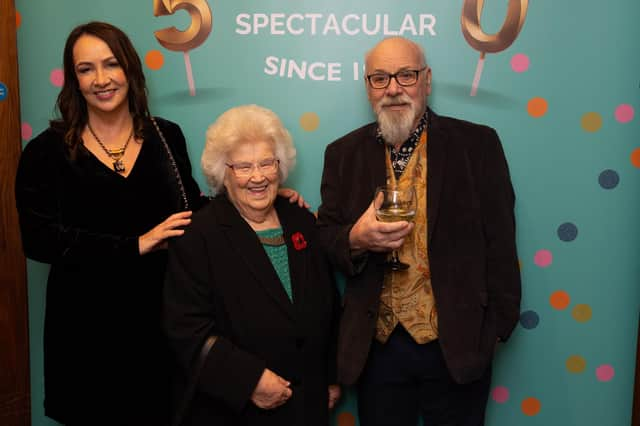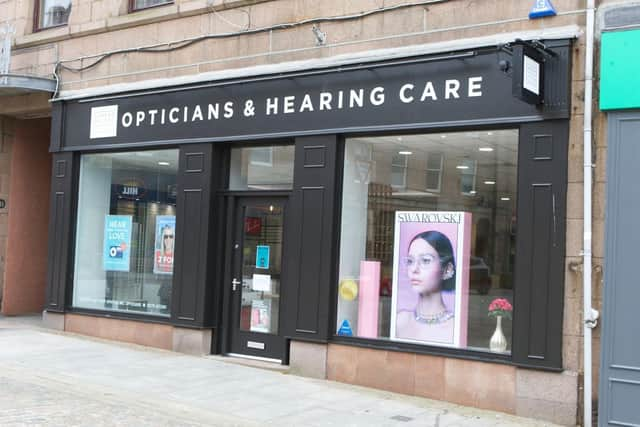Peterhead woman reflects on life at local optician


Stuart Todd joined the business the following year and now 50 years on, Duncan and Todd now has 40 branches right across the country. Jean, who went from being a receptionist to a dispensing optician, was there for the first 25 years of those until retiring in 1997.
She reflects on some of the changes which took place over the years and some memorable moments from her time there.
Advertisement
Hide AdAdvertisement
Hide AdShe started as a part-time receptionist, a role which quickly expanded to a full-time as Peterhead was followed by the opening of five new practices in Banchory, Ellon, Inverurie, Dyce and Aberdeen with Jean taking on payroll and book-keeping duties for all six branches.


At that time, the Peterhead practice was based in a house on Queen Street, with a brass plaque outside identifying it as the optician. Next door was a chiropodist with a similar brass plaque.
On arriving for an evening appointment, a new customer knocked at the door. She was ushered in and was slightly puzzled when she was told to take her tights off. Even more puzzled when the man who had shown her in appeared with a basin of water!
To spare the blushes of anyone else making the same mistake, it was fortunate perhaps that as it became busier, the Peterhead practice moved from Queen Street to its current location on Marischal Street. It was also bolstered by the arrival of a new optician, Steve Mackintosh.
Jean’s role also changed when she was given the opportunity to train as a dispensing optician. At that time dispensing opticians were a rarity. The optician who tested eyes, also dispensed the glasses and busy opticians didn’t have time to devote to helping customers browse through a selection of glasses – even if such a selection had been available – so choices were few.


Those who got glasses through the NHS had an even narrower choice. It was a scenario Jean was very familiar with.
“I have been wearing glasses since I was three,” she said. “The optician would say to me ‘here are two pairs of glasses suitable for your prescription which will fit you’ and that was my choice. Girls got to choose from pink or clear frames and the choice for boys was brown or black. The lack of choice applied to everyone, children and adults and we just accepted that.
“Many people opted to go private if they could afford it, and most of the children had privately-paid glasses with an NHS pair as a spare.”
Advertisement
Hide AdAdvertisement
Hide AdAs a dispensing optician, Jean’s role was to advise customers on their vision care and to help them choose their glasses and lenses. She was also the buyer who selected the branch’s range of eyewear.
Changes to NHS criteria meant that fewer people were eligible for free glasses, and with more people going private and opting for non-NHS glasses, the choice of what was available increased significantly.
“I just loved the job,” she said. “Part of the reason was that I started at a very good time for opticians because so much was changing. When I started they were all glass, heavy, and bifocals were ugly. They introduced plastic lenses and just about everyone switched to them because they were lighter and safer and there were more choices.
“Bifocals improved and varifocal lenses were introduced. Soft contact lenses replaced the hard ones that wearers gradually had to work up to wearing all day, starting with a just a few hours at a time until they got used to them.
“There was a little girl who got hard contact lenses and her mum had to run up and down to the school every day to take them out after a few hours.
“It was a pleasure to spend time with people helping them make their choices and it gave me great satisfaction. As a glasses wearer myself I had never had a choice before, so I knew exactly how they felt. At that time, we didn’t have the shop displays, our glasses were displayed in drawers, and I always made sure there was a good selection in all sizes.
“Fashion also started coming into it when designer frames became available, and Duncan and Todd was always up to date with the very latest styles. I got to know what customers wanted and I always made sure that I had styles in stock that they’d like.
As Duncan and Todd continued to grow, opening new branches across the country, it continued to build its reputation for being at the forefront of changes and developments in the optical business and Jean’s job took her to Birmingham for a trade show and to Milan for an optical fair.
Advertisement
Hide AdAdvertisement
Hide Ad“Duncan and Todd was a great place to work, they really invested in their people, and took a personal interest in their staff, she said. When my husband was made redundant, they arranged for him to retrain and then offered him a job in Peterhead.”
When Norman and Stewart retired, the business was bought by Frances Rus.
“Frances made sure it continued to be a great place to work,” said Jean. “There’s a celebration in November for everyone who was with the company for at least 25 years. I think the fact so many people worked for 25 years or more says a lot about Duncan and Todd.”